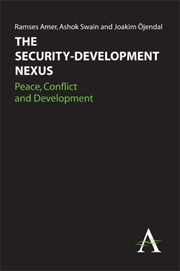Book contents
- Frontmatter
- Contents
- List of Tables and Figures
- List of Editors and Contributors
- Acknowledgements
- Chapter 1 Researching the Security-Development Nexus through a Multi-disciplinary Approach
- Chapter 2 Exploring the Security-Development Nexus
- Chapter 3 Liberal State-Building and Environmental Security: The International Community between Trade-Off and Carelessness
- Chapter 4 The Rising China and Maintaining the International Order: Some Reflections
- Chapter 5 Non-use of Force, Non-interference and Security: The Case of Pacific Asia
- Chapter 6 International Dimensions of Peace Processes in Aceh and Sri Lanka: The Role of Intermediaries in the 2000s
- Chapter 7 The Challenges of Human Security and Development in Central Asia
- Chapter 8 Diasporas' Role in Peacebuilding: The Case of the Vietnamese-Swedish Diaspora
- Chapter 9 Tracing Minerals, Creating Peace: The Security-Development Nexus in the DRC
- Chapter 10 Water Management and the Security-Development Nexus: The Governing of Life in eThekwini Municipality, South Africa
Chapter 1 - Researching the Security-Development Nexus through a Multi-disciplinary Approach
Published online by Cambridge University Press: 05 June 2012
- Frontmatter
- Contents
- List of Tables and Figures
- List of Editors and Contributors
- Acknowledgements
- Chapter 1 Researching the Security-Development Nexus through a Multi-disciplinary Approach
- Chapter 2 Exploring the Security-Development Nexus
- Chapter 3 Liberal State-Building and Environmental Security: The International Community between Trade-Off and Carelessness
- Chapter 4 The Rising China and Maintaining the International Order: Some Reflections
- Chapter 5 Non-use of Force, Non-interference and Security: The Case of Pacific Asia
- Chapter 6 International Dimensions of Peace Processes in Aceh and Sri Lanka: The Role of Intermediaries in the 2000s
- Chapter 7 The Challenges of Human Security and Development in Central Asia
- Chapter 8 Diasporas' Role in Peacebuilding: The Case of the Vietnamese-Swedish Diaspora
- Chapter 9 Tracing Minerals, Creating Peace: The Security-Development Nexus in the DRC
- Chapter 10 Water Management and the Security-Development Nexus: The Governing of Life in eThekwini Municipality, South Africa
Summary
Introduction
Following a global flurry of ‘new wars’ and ‘new conflicts’ in the post–Cold War era (Kaldor 2007; Keen 2008), a lot of rethinking has been done (and certainly will be done) on the causes of violent conflict in the global system. After a decade dominated by, inter alia, ‘9/11’, the unstable and violent African development context and the relatively sustainable peace (and very successful development) in East Asia, reflections on the relations between development and security (and vice versa) became unavoidable. In policy documents (e.g., UN 2004; OECD 2007; DFID 2005; European Council 2003, 2008; UNDP 2005), as well as in academic circles (Buur, Jensen and Stepputat 2007; Chandler 2007, 2008; Duffield 2001, 2007; Paris and Sisk 2007), the ‘development-security nexus’ was coined as a concept and emerged as a hotly contested topic. Unsurprisingly, the policy world was jumping to ‘new solutions’, with reductionist conclusions, whereas research remained more sceptical. For instance, irrespective of whether we listen to the ‘new’ United States foreign policy articulated by Colin Powell or by General Petraeus, to the secretary-general of the United Nations and to the International Commission on Intervention and State Sovereignty on ‘Responsibility to Protect’ (UN 2009; ICISS 2001), or the European Union's ‘European Security Strategy’ (European Council 2008), the attention is increasingly on how conflicts of various sorts can be prevented through greater focus on ‘development’. The nexus became a commodity over which intellectual ownership was as unclear as important.
Information
- Type
- Chapter
- Information
- The Security-Development NexusPeace, Conflict and Development, pp. 1 - 12Publisher: Anthem PressPrint publication year: 2012
Accessibility standard: Unknown
Why this information is here
This section outlines the accessibility features of this content - including support for screen readers, full keyboard navigation and high-contrast display options. This may not be relevant for you.Accessibility Information
- 2
- Cited by
